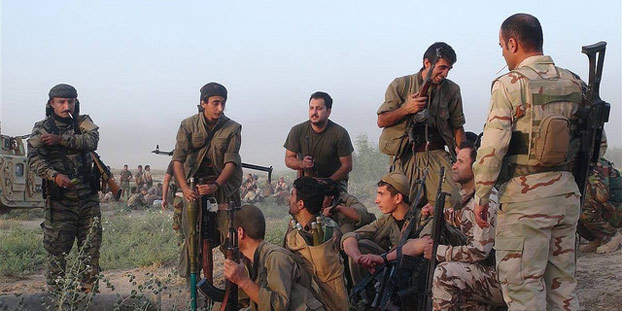The Iraqi army and allied militias have taken over areas in northern Iraq near the autonomous Kurdish region. For some background, here are five questions about the Iraqi Kurds.
1. Why are Iraqi and Kurdish forces fighting? They are all Iraqis, right?
Yes, they are all Iraqis according to their passports, but the Kurds enjoy a special status within Iraq. Since Saddam Hussein’s Anfal campaign against the Kurds in the eighties, the Kurdish region has enjoyed some level of autonomy from the central government in Bagdad. This was formalized in the Iraqi Constitution of 2005 with the establishment of a Kurdish Regional Government (KRG). However, an area of land bordering the Kurdish region is claimed by both the Iraqi and Kurdish administrations. These “internal disputed boundaries” include Kirkuk and the Ninewa Plains and are home to Kurds and Arabs, but also many other minority groups, such as Yezidis, Christians and Turkmen. Since 2015, the Kurds were able to take control of most of this disputed area when they helped push ISIS out.
Capitalizing on these territorial gains, KRG president Barzani unilaterally organized a referendum on 25 September on Kurdish independence. People were asked to vote in the Kurdish region and in the disputed territories, including Kirkuk. Iraq and most of the international community were against holding the referendum, but it was held anyway amid great Kurdish patriotic fanfare and without transparent oversight. An overwhelming majority supported an independent Kurdish State. The Iraqi government’s response has been to halt international flights to KRG and to send in the Iraqi army and allied militias to retake control of the disputed territories.
2. What is the Kurdish Region of Iraq?
The Kurdish Region of Iraq is an autonomous region in the north of Iraq with between 5 and 7 million inhabitants (there are no reliable census figures and the region hosts many displaced Iraqis and refugees from Syria). Some Kurds consider Iraqi Kurdistan to be part of Greater Kurdistan, covering areas in neighbouring Turkey, Iran and Syria. Since 1991, Iraqi Kurdistan has functioned quite independently from the central government in Baghdad. Kurdistan has its own military force, called the Peshmerga, which is internally controlled by Kurdish KDP and PUK political parties (see question 4).
3. Is Kirkuk in the Kurdish Region of Iraq?
Although Kurds are estimated to make up nearly half of the population of Kirkuk, it is formally not part of the autonomous Kurdish area. However, during the rise of ISIS, Kurdish forces took advantage of the chaos in norther Iraq to take control of areas outside the recognized Kurdish region. These areas include Kirkuk. Under Saddam Hussein´s rule, Kirkuk underwent Arabization campaigns which altered the demographic balance in the city. After the Peshmerga took control of Kirkuk in 2014, many Kurds have returned but the lack of an objective census complicates an overview of the current ethnic balance.
4. Are the Kurds united?
No. The Kurdish Regional Government is divided between spheres of influence, primarily between two Kurdish political groups. The Kurdish Democratic Party (KDP) of KRG president Masoud Barzani is alligned with Turkey, and enjoys most support in Dohuk and Erbil. The Patriotic Union of Kurdistan (PUK) of the recently deceased Jalal Talabani has ties to Iran and Baghdad and is centered in Suleymania and Kirkuk. The dominance of tribes in both these parties, partisan power-plays and the lack of orderly transition of power has resulted in widespread distrust and frustration towards Kurdish leadership in general.
5. How will this end?
Hard to say. The sudden takeover of Kirkuk and other areas by the Iraqi army and aligned militias, coming so close on the heels of expectations of independence, has left many Kurds feeling deceived by the own leadership and has increased the opposition to Barzani in particular. In addition, Kurds feel betrayed by the international community and by the Iraqis following Kurdish sacrifices in the war against ISIS. Many are in particular afraid of the Popular Mobilizations Units (PMU, or Hashd al Shaabi), notorious for human rights violations in their fight against ISIS. Due to the lack of a strategy for what happens after ISIS is defeated, the main local allies of the International Coalition Against ISIS are now turning against each other for control of the areas where ISIS has retreated. A sustainable solution and inclusive power-sharing will be vital to prevent new rounds of conflict.
PAX calls on all parties to stop the use of violence and to initiate dialogue with representatives of all communities, including members of civil society.
Bonus: What does PAX do in northern Iraq?
PAX has established a number of peace committees in northern Iraq in an effort to rebuild trust among the various communities. The peace committees are in Ninewa Province, which has a large diversity of ethnic and religious groups. Trust among these groups suffered greatly when large parts of the province were overtaken by ISIS. PAX is committed to continuing our work with these committees.
PAX, in close coordination with its local partners, also conducts its Human Security Survey project in Kirkuk, as well as in Salahaddin and Basra governorates. Through this initiative we solicit information from a wide cross-section of Iraqi citizens about their experiences in conflict, the impacts of insecurity on their daily lives, and their expectations for the future. We then bring this data back to facilitate constructive dialogue between local communities and relevant authorities about how to improve the protection environment with a focus on civilians’ needs, priorities, and capacities.
See the Iraqi Civil Society Solidarity Initiative´s statement about the Kurdish referendum, and their statement calling for dialogue.
See also What Happens After Mosul? and Remembering Yezidi Massacre




